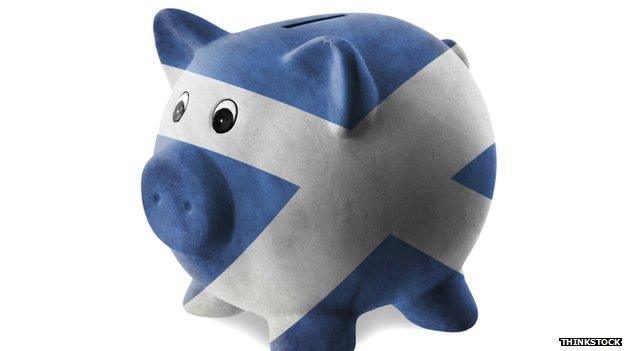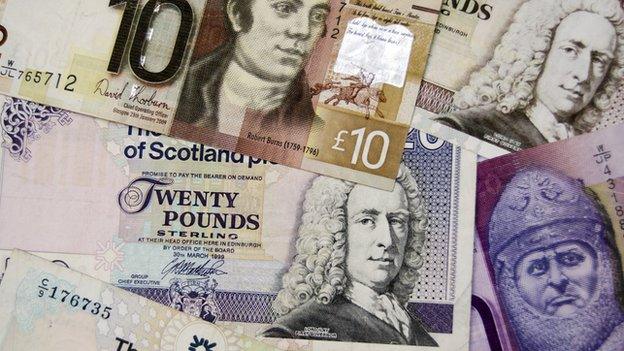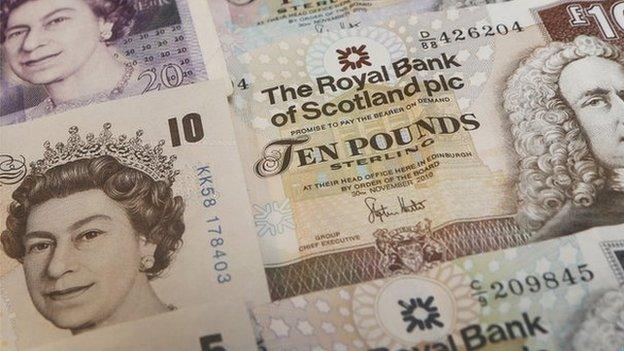Scotland's sticky finances
- Published

Scotland is running at a loss. And you'd be forgiven for also being at a loss about the conflicting use of statistics over just how much it's in the red, or how badly.
You can emphasise that tax paid in Scotland, and from its offshore oil and gas, was £400 per head more than the UK figure, during the last financial year, 2013-14.
Or you could choose to highlight the figure showing that spending was £1,200 per head higher. Or you could pick a fight over the deficit's share of Gross Domestic Product.
The £400 extra tax revenue is the one that puts Scotland in a better position than the UK.
The others don't look so good for those arguing for full autonomy over taxation and spending, or independence.
Whichever way you read it, it's worth remembering that running government at a loss isn't as bad as it sounds. It's not a business. The overspend can be to help growth, if it's well managed.
And while Scotland runs at a loss, the UK government continues to run at a similar scale of loss, with a huge debt, and nothing to show in the bank for 40 years of oil and gas tax revenue.
So those from the three main Westminster parties, who wish to pick holes in the case for Scotland having more tax powers, might also bear in mind that their own record of running deficits, failing to control deficits and building up debt is hardly an inspiring example for others.
Offshore share
This year's dose of GERS figures (government expenditure and revenue Scotland) show that the reduced level of public spending, due to the squeeze coming from the UK Treasury, would be reducing the deficit were it not for the falling take from offshore oil and gas.
A Scotland-only deficit reduction plan would have to cope with a deficit that is unsustainable beyond the short-term. The eurozone rules set a 3% maximum (though widely ignored of late), whereas the latest figures put Scotland on 8.1%.
It would also have to counter the prospect of offshore tax take falling quite fast, with much more impact than on UK finances, as a result of the oil price fall and lower production levels.
There has been much dispute about the future trajectory of offshore revenue. The Scottish government has been pressed to update last year's figures, which appeared to be optimistic, in the light of the halving in the oil price.
In turn, it has been critical of the Office for Budget Responsibility, which has taken a particularly gloomy view of that revenue source.
A further complication is that the share of oil and gas revenue coming from Scottish waters is now contested. HM Revenue and Customs is trialling its own figures.
They look less favourable than those drawn from Prof Alex Kemp's long-running work at Aberdeen University, from which GERS draws its reckoning.
This year, it assumes that although 75% of the energy value is drawn from Scottish waters, that is mainly oil rather than gas, and oil is more profitable. So Scotland gets allocated an 84% share.

All this makes it difficult to forecast where the public finances may be going over the next few years. But that hasn't stopped public finance number-crunchers from giving it a go.
At Fiscal Affairs Scotland, the small outfit run by economists Jo Armstrong and John McLaren, they've taken the OBR projections from December and foresee a worsening of Scotland's deficit for the financial year which is soon to end.
From £12.4bn in the most recently published figures, they look to £13.9bn being reported next year. Thereafter, the fiscal balance is set to improve.
But it would continue to run a bigger deficit than the UK, and would still be in the red in 2019-20, while the current Treasury plans are to get into the black in 2018-19.
Note that the forecast uses December figures for OBR, when the oil price was already falling, but the worst had yet to come.
With next week's Budget at Westminster, the OBR will give an update on its future offshore revenue projections, taking this year's lower oil price into account.
Oil price fall
The Institute of Fiscal Studies (IFS) has also been quickly onto the case. Likewise, it has drawn on those OBR figures from December, and reckoned that the oil revenues allocated to Scotland for 2014-15 will be down from £4bn to £1.8bn.
That would mean the deficit would be as big a share of national output in 2015-16 as it was in 2013-14. In other words, for all the squeeze on public spending, the oil price fall would leave Scotland with no progress in reducing its deficit.
In perhaps more intelligible numbers, the IFS's David Phillips suggests the deficit per head in Scotland in 2015-16 would be more than twice as high per person (around £2,600) as that in the UK as a whole (around £1,200).
Dynamism
There is an answer to all this. First Minister Nicola Sturgeon says GERS reflects on the recent past, and the performance of the Scottish economy within the UK, under the Treasury's thumb.
Holyrood control of the tax levers would deliver fast growth, says the Scottish government. That would be growing out of the red, rather than cutting. Wise use of those levers could boost productivity, private sector investment and increase exports 50%.
That's true. It could. But remember, those are objectives which are already being pursued by the UK government. They may not be as easy to achieve as the rhetoric suggests.
And the IFS points out that at least two of the headline measures the Scottish government wants to introduce to boost growth - more generous childcare, and investment tax breaks for business - are not guaranteed to get the desired results, while actually weakening public finances even further.
There are basically three economic arguments for Scottish independence: look how we've under-performed over time and been let down: look how strong we've been recently: and look how much better we could be if we could apply some more dynamism.
The argument for current economic strength played big in last year's referendum campaign. These most recent GERS figures require the first minister and her followers to shift the emphasis a bit, towards how different things could be, if only.
- Published11 March 2015
